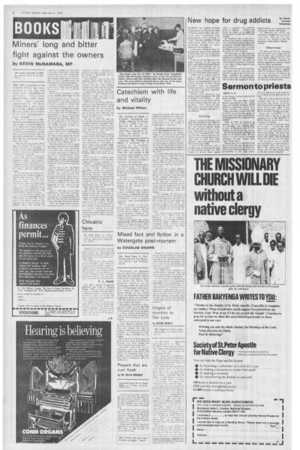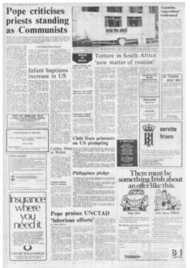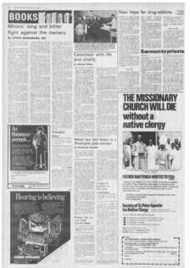Page 6, 21st May 1976
Page 6

Report an error
Noticed an error on this page?If you've noticed an error in this article please click here to report it.
Tags
Share
Related articles
King Coal's Seeds Of Bitterness
The Herald Says
Kevin Mcnamara
Mcnamara Plan For Ireland
Catholic Mps Back Women Clergy
Miners' long and bitter fight against the owners
by KEVIN McNAMARA, MP
The Great Lock-Out of 1926 by Gerard Noel (Constable £5.25).
THE 50th anniversary of the General Strike has been marked in the past few weeks with a multiplicity of articles, television, programmes, radio inter views and colour supplements, All have recalled that it was in sup port of the miners. It failed because of the lack of nerve of the TUC. Unprepared for such a struggle.
The TUC failed to understand the determination of working people to improve their lot or to appreciate their resilience in adversity. as witnessed by the spreading and spontaneous support of union members who had not been instructed to withdraw their labour, coming out to support the strike, After the ninesday wonder which was the General Strike, and the TUC instructed its members to return to work, there still remained a million miners out of work — not a strike but a lock-out.
Following Winston Churchill's return to the gold standard, with its disastrous effects upon Britain's balance of trade and exports, the coalowners were determined to extend by one hour the working day for miners and to reduce their wages.
It is to tell why the miners were locked out and of their struggle during the high summer of 1926 to the start of winter, and the bitter November return to work — starving, in rags. weak. the whole cause lost. the union smashed as an organisation. the harshness of the coalowners and the blacklist — that Gerard Noel recounts his story.
It is the best hook. indeed as recall. the most comprehensive and hest written account, that I have read of the miners lock-out. Not least because of Ids last chapter Vox Populi, where Noel records the memories 01 peopie Ived in the strike. their observatioes, the longterm effects upon the mining coinnsunity, the break-up of families, the crushing; of the spirit of urn unable to find re-employment, the bankruptcies of small businesses.
Despite Cardinal Bourne's condemnation of the General Strike. the miners' case was certainly justified.
The Sankey Commission in 1919, to the surprise and dismay of the Government of (lie day, recommended that the mines he Lloyd George and the Unionists sought to evade that recommendation which the Government was pledged to accept.
Yes if there was one justificatiOn of the strike and the bitterness it engendered, it is a throw-away statement in Noel's narrative, "between 5f$) and 600 colliers did not die in the lock-out as otherwise the} might have done according to the weekly average of fatal accidents in the pits."
The strike and its aftermath had a lasting effect upon working-class history and ideas. A myth? When the miners struck against the Heath Government they were referred to by Bob Mellish as the "Guards of the Trade Union Movement."
The memories of that struggle had etched themselves on the minds of' working men, and even if the miners had heen betrayed by the rest of the trade unions in 1926, this certainly was not true of the 1970s, when the railway unions were telephoning the miners urging them to put pickets on the railway bridges to give an excuse to the drivers not to pass.
It was true of both the Heath strikes: progressively people were coming out of work, working shorter hours, the country was grinding to a halt but there was no hostility towards the miners. It was almost as though people were making their retribution for what had happened to the miners in the 1920s. before most of them were born.
Rut in 1926 the miners were hound to he crushed, The combination of the Government, the coalowners. the unpreparedness of the TUC and its failure to respond to the challenge. led to their defeat.
There are things which could be mentioned but are not, for instance Chopwell Colliery. Chnpwell is referred to in the narrative as "Little Moscow". Regretfully, all the story is not there. Lord Blvton, one of the old Durham miners' MPs, told me of the owners of the Chopwell Colliery. He said: "The Durham owners were cruel. but the Consett Iron Company were the cruellest," A man called, George, one of the directors. a well known laypreacher "would not talk to us across the table, only speak to us through the ducket."
Bob Woof, the MP for Blaydon. worked in the Chopwell Pit, where his father had been a sinker, He left school in July. 1925. but was never employed until he was 19 years of age, Chopwell, with 5,000 men. was one of the biggest pits: it had to be broken by the owners.
As earls. as. June 28, 1925 the Chopwell miners had gone on strike against a reduction in wages. Then came the lock out on May 4 and the return in November, but it wasn't until March 27, 1927, that the Chopwell men went back
They stood out after all the others because of the victimisation of their leaders by the owners. George again was asked by representatives of local free churches "was there no way in which an honourable settlement could be arrived at as children were starving?" The lay preacher stated: "There is 110 sentiment in business, They come back on my terms."
Chopwell has no pithead now. and the slag-heaps have long been landscaped: but the memories are still there — and the foils history.
The Consett Iron Company owned the colliery, owned the steelworks. owned the farmland. This was not the only example of interlocking interests. and Gerard Noel has illustrated the connections between shipping, mining and steel companies, and other business interests, and the leaders of the Government. Even the Minister of labour was a coalowner.
The author also shows how the whole of the establishment was engaged in the task of beating the miners, There was no overt conspiracy: there didn't need to be one.
This is a good book. and not emotive it is scholarly, lucidly written. objective, as sympathetic to the problems of the mineowners as it is to the miners. It is well researched. a comprehensive story. suitably illustrated, Read it: you will understand why the Heath Governmeet ('ell.
blog comments powered by Disqus











